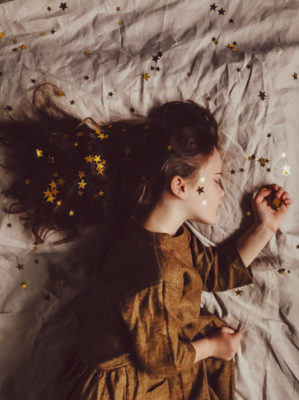
have you ever wondered why we dream and what they mean?
As her weary head laid upon the silk pillowcase and the stars danced outside her window, her mind wandered into the colourful abyss which was her imagination. Exhaustion overcame reality and quietly she slipped into a reverie. And until the morning broke, here she would remain; in a world of her own creation.
By Jorja Suga, 13
Dreams. The stories that our minds design while we sleep. Despite humans generally remembering only 5% of dreams, this universal semi-conscious experience can be awkward, romantic, frightening, enjoyable, entertaining and sometimes perplexing. But, how and why do dreams occur and what exactly do they mean?
Dreams can occur at any time during sleep, but the most vivid dreams predominantly occur in the fifth stage of sleep, called REM sleep. This stands for ‘Rapid Eye Movement’ when heart rate rises, blood pressure increases and eyes jerk rapidly.
Neuroscientists have spent years researching dreams, how and why they occur and whether or not they have anything to do with our life in the conscious world. Sigmund Freud, a famous Austrian Neuroscientist quoted that “Every dream will reveal itself as a psychological structure, full of significance”.
Although scientists know what dreams are, nobody really knows why we dream, however there are plenty of theories to go by. For example, some neuroscientists would say that dreams are unconscious wishes and/or desires that we have for the real world, whereas other scientists may say that dreams are a way to relax the mind and process the information and events from the previous day.
One major discovery in Neuroscience, in terms of dreams, is that all dreams are based on one of two types of memories. These are autobiographical memories which are long-lasting memories about the person and episodic memories which are about specific events or episodes in the person’s real life. Generally, most dreams are based on autobiographical or personal long-lasting memories.
Dreams are not only influenced by our personal experiences, but by many other factors including age, gender and sleep disorders. Generally, younger people are more likely to experience their dreams in colour and are also more likely to remember more details of their dreams when they wake up. On the other hand, older people are not expected to see their dreams in colour often and they are more likely to struggle with remembering key details in their dreams, after they wake up. Weirdly, however, the difference in dreams between males and females were not very obvious, with the only major variation being that females generally have more family members, children and babies in their dreams, whereas males are often by themselves. People who have sleeping disorders such as insomnia and narcolepsy, often have dreams that have more of a negative tone, when compared to people without any sleeping disorders.
As technology develops, major discoveries about dreams have increased in the last few years. In 2013, Japanese scientists started ‘reading’ dreams using MRI scans of the brain with approximately 60% accuracy. This Japanese study has expanded as scientists begin to question whether they can not only read what the dreams are, but experience the emotions that the person asleep is feeling and improve the accuracy of the tests.
I wonder how long it will be until scientists know why we really dream and what they really mean?
- Dreams: Causes, Types, Meanings, What they are and more. (2018, June 28). Medical News Today. Retrieved May 20, 2020, from https://www.medicalnewstoday.com/articles/284378
- Ellis, J. (2020, April 20). Why do we experience dreams and nightmares? Independent. https://www.independent.co.uk/life-style/why-we-dream-sleep-stress-anxiety-insomnia-a9470686.html
- Cherry, K. (2019, October 07). 10 Interesting Facts About Dreams. Verywell mind. https://www.verywellmind.com/facts-about-dreams-2795938